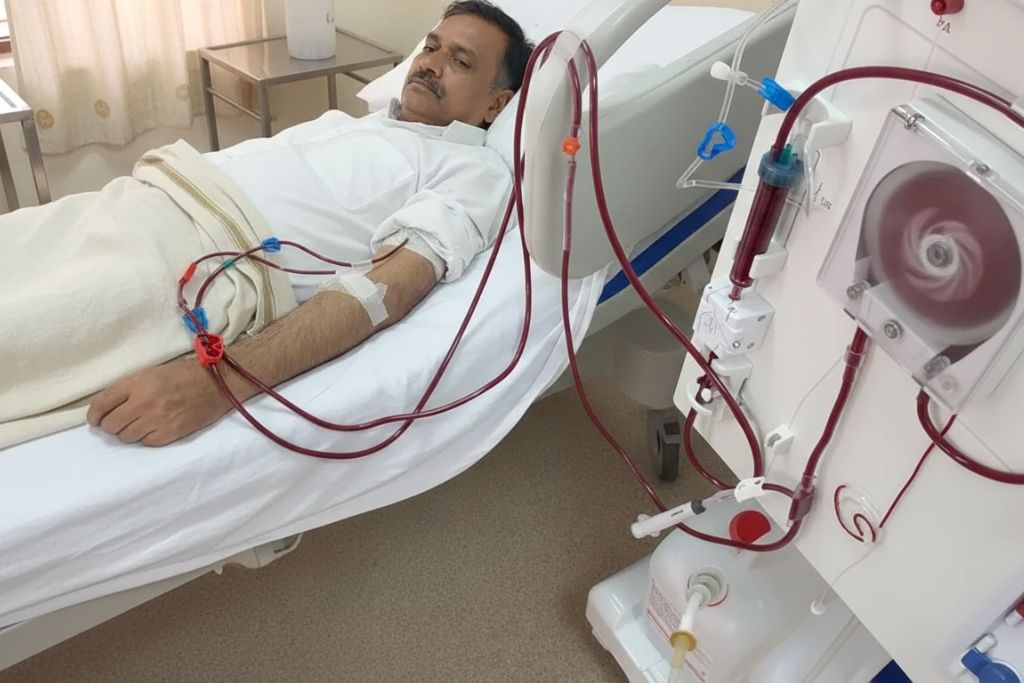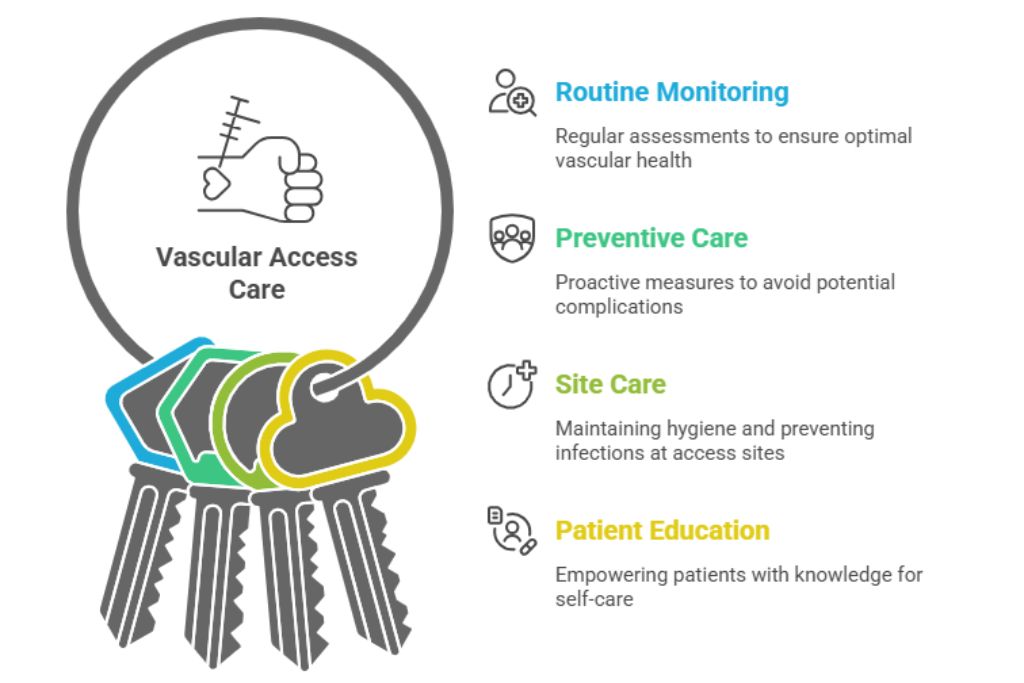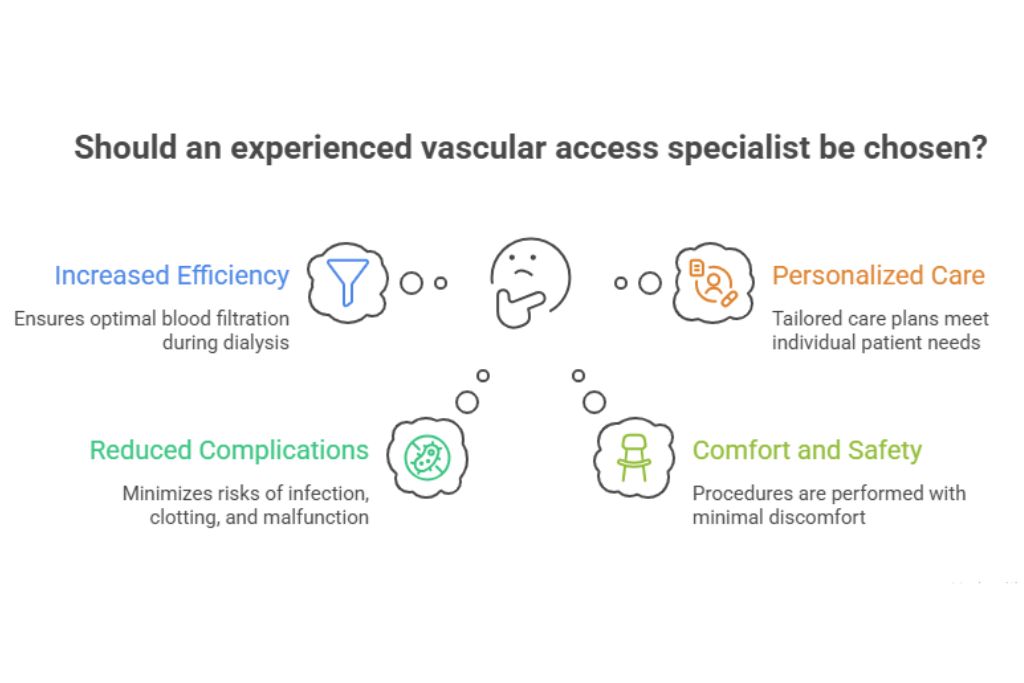Vascular Access Care in Gorakhpur – Expert Care for Reliable Dialysis

Vascular Access Care
Dialysis is a life-saving treatment for patients with kidney failure, helping remove excess fluids, toxins, and waste products from the blood when the kidneys are no longer able to perform this function. Central to effective dialysis is vascular access – the pathway through which blood is withdrawn, filtered, and returned to the body. Without reliable vascular access, dialysis can be less efficient, uncomfortable, or even unsafe.
At Regency Hospital, Gorakhpur, Dr. Arpit Srivastava, a leading nephrologist, provides comprehensive vascular access care in Gorakhpur, ensuring that each patient receives safe, precise, and long-lasting dialysis access. With advanced monitoring and expert guidance, patients experience improved outcomes, comfort, and quality of life.
+91-7054357996Arteriovenous (AV) Fistula
An AV fistula is created surgically by connecting an artery to a vein, usually in the arm. This access is considered the gold standard for long-term dialysis due to its durability, lower infection risk, and efficient blood flow.
Benefits of AV Fistula
- Long-lasting and reliable for chronic dialysis
- Reduced risk of infection compared to catheters
- Better dialysis efficiency due to high blood flow
Maintenance Tips
- Monitor for changes in color, swelling, or warmth
- Avoid heavy lifting or pressure on the fistula arm
- Regularly check the thrill (vibration) at the fistula site
Arteriovenous (AV) Graft
An AV graft involves connecting an artery to a vein using a synthetic tube. This is often used when a patient’s veins are unsuitable for a fistula.
Benefits of AV Graft
- Provides reliable long-term access
- Ready for dialysis faster than an AV fistula
- Suitable for patients with smaller veins
Maintenance Tips
- Careful monitoring for clots or infections
- Gentle handling to prevent damage to the graft
- Follow-up with your vascular access specialist for regular evaluation
Central Venous Catheters (Permacath & Jugular Catheter)
Central venous catheters are temporary or semi-permanent catheters inserted into large veins such as the internal jugular or subclavian veins. They are typically used when immediate dialysis is required, or while waiting for a fistula or graft to mature.
Benefits of Central Venous Catheters
- Quick access for urgent dialysis
- Useful for patients with complex vascular conditions
- Can be used temporarily while planning permanent access
Maintenance Tips
- Keep the site clean and dry to prevent infection
- Avoid tugging or twisting the catheter
- Monitor for redness, swelling, or leakage
Vascular Access Care – What It Involves
Proper vascular access care is essential to ensure the success of dialysis. It involves routine monitoring, maintenance, and preventive strategies to avoid complications.

Key Components of Vascular Access Care
- Routine Monitoring: Regular assessment of blood flow, vein health, and signs of infection or clotting
- Preventive Care: Timely interventions to prevent complications before they escalate
- Site Care: Cleaning and dressing changes to maintain hygiene and prevent infection
- Patient Education: Teaching patients how to care for their access at home and recognize warning signs
Common Complications and How They Are Managed
Common Complications Include:
- Infections: Risk at the access site or bloodstream
- Blood Clots: Can obstruct blood flow and reduce dialysis efficiency
- Malfunction or Blockage: Impaired access requiring medical intervention
- Swelling or Bleeding: Minor issues can be managed with care
- Vessel Damage: Rare but serious complications that require prompt attention
Management Strategies:
- Strict Hygiene Protocols: During dialysis to reduce infection risk
- Ultrasound-Guided Monitoring: Regular checks of blood flow and access function
- Timely Medication Adjustments: To prevent clotting and maintain access patency
- Patient Education: Empowering patients to identify warning signs early
Vascular Access Maintenance and Monitoring
Importance of Regular Monitoring
Regular monitoring is critical for long-term success. A vascular access specialist in Gorakhpur ensures:
- Proper Blood Flow: For efficient dialysis
- Early Detection: Identifying infections or thrombosis promptly
- Maintenance: Care of AV fistulas, grafts, or catheters
- Personalized Guidance: Home care and lifestyle adjustments
Patient Tips for Maintenance
- Check for thrill or pulse at the access site daily
- Avoid tight clothing or jewelry on the access arm
- Attend all follow-up appointments
- Notify your specialist immediately if you notice redness, swelling, or pain
Benefits of Expert Vascular Access Care
Advantages of Choosing an Experienced Vascular Access Specialist
- Increased Dialysis Efficiency: Proper access ensures optimal blood filtration
- Reduced Complications: Expert monitoring minimizes infection, clotting, and malfunction
- Comfort and Safety: Procedures are performed with minimal discomfort
- Personalized Care: Individualized care plans tailored to each patient’s needs

Why Choose Dr. Arpit Srivastava for Vascular Access Care in Gorakhpur

Dr. Arpit Srivastava is a trusted vascular access specialist in Gorakhpur, providing world-class dialysis care.
- Credentials & Expertise: DM Nephrology (SGPGI), MRCP SCE (UK), 200+ kidney transplants
- Comprehensive Care: Safe AV fistula, AV graft, and catheter placements
- Ongoing Support: Long-term monitoring and integration with overall kidney disease management
Frequently Asked Questions
Contact and Consultation
For expert vascular access care in Gorakhpur, trust Dr. Arpit Srivastava to provide safe, precise, and compassionate care. Whether you need an AV fistula, AV graft, or catheter, our team ensures reliable dialysis access and ongoing support.
Callout:Schedule a consultation with a top vascular access specialist in Gorakhpur today and ensure safe, reliable dialysis care for a healthier kidney journey.
How often should vascular access be checked?
Regular check-ups are recommended at least every 1–3 months or as advised by your specialist.
Can I shower with an AV fistula or catheter?
Yes, but avoid direct water contact on the site and use waterproof dressings if needed.
What should I do if I notice swelling or redness?
Immediately contact your vascular access specialist in Gorakhpur for evaluation.
When is revision or replacement of vascular access needed?
If the access shows signs of blockage, infection, or malfunction, revision or replacement may be required.
How do I recognize infection at the access site?
Look for redness, swelling, warmth, pain, or discharge at the site. Report any signs immediately.
Can I exercise with an AV fistula or graft?
Yes, light exercises are allowed, but avoid heavy lifting or pressure on the access arm. Always follow your specialist’s advice.
Let's Connect
Room no 19, Second Floor, Regency Hospital, Plot No-623, Medical College Road, Gulhariya, Gorakhpur, Uttar Pradesh 273013
Hours:
- ● Monday: 10 am – 5 pm
- ● Tuesday: 10 am – 5 pm
- ● Wednesday: 10 am – 5 pm
- ● Thursday: 10 am – 5 pm
- ● Friday: 10 am – 5 pm
- ● Saturday: 10 am – 5 pm
- ● Sunday: Closed
Help Is Here—Call Now!
Immediate support is just a call away. Reach out now and let us take care of the rest.


